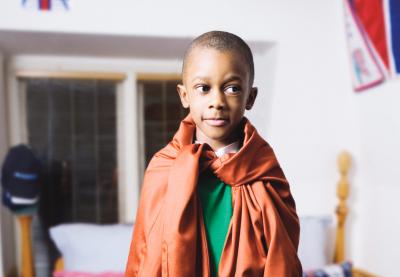"What is a hero?" I asked my 9-year-old son recently, expecting to hear a definition including words such as super-human powers, bravery and saving lives.
He didn't disappoint, matter-of-factly explaining a hero is someone who uses his powers to help or save other people.
"Does a hero have to have special powers?" I asked.
He thought for a moment, squinting his eyes and twisting his lips. "I guess not," he said. "Like Martin Luther King Jr. was a hero, and he didn't have special powers. But he wasn't just a normal person -- he did a lot of great things to help the world. Just a regular person probably couldn't do all the things he did."
"Do you think you could do the things he did?" I asked.
He shrugged. "Probably some things," he said. "But I don't know if I could be a hero like him."
In classrooms and communities across the country, the start of the new year often is signaled by celebrations honoring the January birthday of Martin Luther King Jr. and special programs and assignments highlighting February's Black History Month.
We read books, speeches and poems about the achievements of Dr. King. We quiz children about the accomplishments of famous black inventors, civil rights leaders and entrepreneurs. And in many ways, we are responsible for communicating to children the notion that these men and women were heroes, larger-than-life figures whose shoes could never be filled by those who walk among us.
While it is vital to teach children about the lives and accomplishments of prominent leaders such as Dr. King, it also is vital that we empower children to believe they, too, are capable of, in the words of my son, doing "great things to help the world." Providing kids with examples of leaders and activists in whom they are able to see themselves is one way to do that.
There is perhaps no better time to offer such an example than now, as we prepare to mark the 50th anniversary of the courageous actions of the Little Rock Nine. The group of nine ordinary high school students braved angry, jeering crowds during the fall of 1957, in an attempt to integrate Central High School in Little Rock, Ark. Their actions resonate still, as the nation's schools are resegregating. For my son, and for all children, the story of the Little Rock Nine provides real-life proof that young people possess the power to be activists, heroes even. For me, their story is a reminder that as a parent, I must regularly offer my son opportunities to learn more about issues he cares about, as well as encourage him to find ways to get involved.
From petitioning for an accessible neighborhood playground to raising money for a charitable cause to cleaning up a city block, there are opportunities in every community for young people to take a stand and make a difference.
As parents, we must teach our children that they need not possess "special powers" to create change in their own communities, small scale or large. All they really need is the courage to speak up and the desire to make a difference -- and, of course, parents and other adults who support their ideas and take them seriously.
These tips, adapted from The Youth Activism Project (www.youthactivism.org), can help parents support children in becoming young activists.
First Steps
- When your child expresses frustration or concerns about an issue, take her seriously. Talk to her to find out more about her concerns, and get her to jot down ideas for solutions.
- Try to record your child's exact words and phrases about the issue, and resist reshaping her idea based on what you think is more realistic or achievable.
- Continue to offer encouragement.
Next Steps
- Brainstorm possible arguments in favor of and in opposition to your child's idea. This will help your child understand all sides of the situation and better plan her approach.
- Discuss who and how many people might be affected by your child's idea.
- Toss around names of friends, neighbors and other likely supporters.
Planning Steps
- Invite other family members or friends to join the brainstorming.
- Think together about what steps might be taken to pursue this idea, including whether the support of a community leader or elected official is needed and which local or national organizations may help.
- Guide your child on what research might be done and consider other information-gathering methods such as a poll, door-to-door canvassing, a survey or an anonymous questionnaire.
Action Steps
- Help your child choose a catchy campaign name or slogan for her idea.
- Help your child contact local newspaper or news stations with information about the campaign.
- Publicize the campaign with handmade posters, fliers, banners or T-shirts.
My son plopped down on the sofa the other day, expressing his dissatisfaction with the absence of a basketball court on the property of our apartment complex.
"I bet if all the kids got together and wrote a letter asking the office to put up a basketball goal, they might put one up," he told me.
"I bet you're right," I said, nodding. "Now where are your pen and notebook?"
Teacher Reflection:
In Soul of a Citizen, Living with Conviction in a Cynical Time, Paul Loeb explores the "mistaken belief that [an advocate] … has to be a larger-than-life figure, someone with more time, energy, courage, vision or knowledge than a normal person could ever possess. … As a result of such images, many of us have developed what I call the perfect standard. Before we will allow ourselves to take action on an issue, we must be convinced … that we have perfect understanding of it, perfect moral consistency in our character, and that we be able to express our views with perfect eloquence." In what ways does this "perfect standard" interfere with your willingness to tackle issues in the classroom, school or community?
